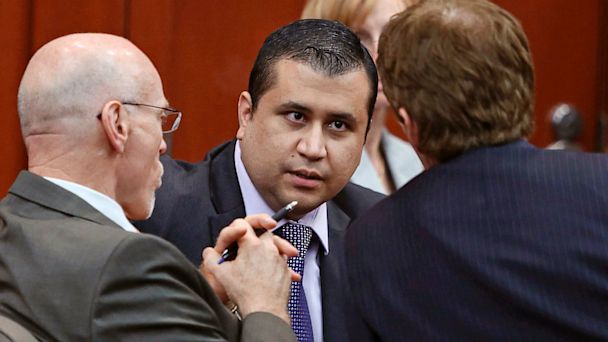Five Questions About George Zimmerman Case Now That We Have a Verdict

George Zimmerman, center, talks to his attorneys Don West, left, and Mark O'Mara during jury deliberations in his trial in Seminole circuit court in Sanford, Fla., July 13, 2013. (Credit: Gary W. Green/Orlando Sentinel/Pool/AP Photo)
The not guilty verdict in the murder trial of George Zimmerman may have presented more questions than it answered. Diane Sawyer asked on Twitter earlier today what is your number one question?
We took the most recurring questions you've been asking and gave them to ABC News anchor Dan Abrams. Here they are with his answers:
@DianeSawyer @ABC Why did the FL prosecution go with Murder 2 charges instead of vol or invol manslaughter?
- JMC (@jimlc2001) July 15, 2013
Dan's answer: They felt they had evidence that this was not just a reckless or negligent killing but an intentional one with "ill will." In retrospect, they probably should have just gone for manslaughter. But I do not think that would have changed the outcome.
@DianeSawyer @ABC my #1 question; why wasn't #TrayvonMartin allowed to defend himself from an apparent stalker?
- DUBNOTSPY (@WhoIsDEF) July 15, 2013
Dan's answer: He is allowed to defend himself. Let's assume that Zimmerman stalked Martin as you suggest (the defense would dispute that). The moment that Zimmerman threatens Martin or lays a hand on him or otherwise places Martin in reasonable fear for his safety, then Martin is allowed to use force to defend himself. But if Martin then gets on top of Zimmerman and starts beating his head into the ground as Zimmerman claims and he can't escape, then the right to self defense shifts to Zimmerman. So if the jurors even had reasonable doubt about whether at the moment Zimmerman fired his weapon he reasonably feared Martin was about to beat him again ("great bodily harm"), it's a not guilty verdict.
@DianeSawyer If Zimmerman was told 2 stay in car, why did he get out & pursue Tray?
- Alice Wrobley (@AWrobley) July 15, 2013
Dan's answer: He wasn't told to stay in his car. When he told the non-emergency operator that he was following Martin, he was told "you don't need to do that" and he responded, "Ok". He was already out of his car at that point. The question is did he keep following Martin as prosecutors allege or was he just walking back to his car as Zimmerman claims.
@DianeSawyer @ABC why was the jury only women??? Not a jury of our peers…
- Naomi j (@naom_j) July 15, 2013
Dan's answer: It just happened that way. After an intense jury selection with the judge and then both sides excluding jurors they didn't like or think could be fair, they just ended up with 6 women. There is no right to have a jury of people who look like you, there are, however, specific protections that prevent either side from keeping jurors off the case because they are a particular race or gender.
@DianeSawyer @ABC What is up with a jury of only 6 people? Am I the only one who finds that number strange????
- Monet (@IlluMonet) July 15, 2013
Dan's answer: In Florida in a non-capital case, a jury can be six people. In most states you would need 12 for a criminal case, but not in Florida.
What questions do you still have? Let us know in the comments.